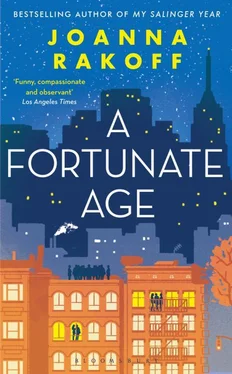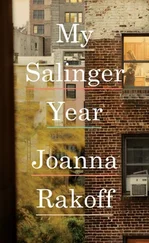“I forgot my manuscript.” Sadie slipped off her sandals, stepped onto the couch, and reached her hand up on top of the tall bookshelf. From her perch, she saw the whole party—like a tableau—the swelling crowd, the little clusters of like-minded sorts within it, girls in bright dresses, their bare arms shimmering. Men bobbing their heads and laughing, handsome, their faces arranged in expressions of intelligence and concern. Their clothing was meant to be ironic—large-collared button-downs from the 1970s, slogan-splattered T-shirts from the 1980s—as though they were holding on to some bits of their childhood as armor against the brash and brutal era in which they’d become adults. The girls, too, wore puff-skirted dresses from the 1950s and 1960s. She felt an urge to draw some sort of attention to herself, to grab one of the glasses that littered the bookshelves and clink it, telling everyone here to… what? “Check, check,” came at her again, a deep baritone from the back of the loft. She looked over at the band and saw, some feet to their left, the door to the bedroom open. Out of it came a thin, dark-haired girl—Caitlin Green—and a moment later, a dark-haired man. The man’s hair was shot through with gray. Tuck Hayes. No, Sadie corrected herself, Tuck Roth -Hayes.
As a child, Sadie Peregrine hated Sunday afternoons, that languorous period when she was meant to start her homework—the homework she’d been avoiding all weekend—and when she began thinking about the tortures of the week that lay ahead. She much preferred Saturdays, at home with her quiet parents, going to matinees, eating Chinese food, or even Sunday mornings , when the entire Peregrine clan—her “immediate extended family,” as she thought of it—gathered around her parents’ table for breakfast. The best part though, was the early morning, before anyone arrived, when her mother slept in and she and her father had the house to themselves, to read the funny pages aloud and eat contraband doughnuts, before running out to the appetizing store on Lex for sable, whitefish, lox, cream cheese, bialys, bagels, and a half loaf of the thin-sliced black bread favored by Sadie’s grandmother, who lived alone in a sprawling apartment off Fifth, tended to by a silent maid named Gretchen, though for as long as Sadie could remember there’d been talk of moving her into the Hebrew Home in Riverdale, if only they could get the lady to agree, which didn’t seem likely. (“To the Bronx ,” she rasped whenever confronted with this idea. “You want me to live in the Bronx ? With old people ?”)
They would arrive home, lugging brown sacks, and Sadie’s father would put on a pot of coffee—even then, the smell was delicious to her—and bring a cup up to Rose, along with the paper, then return to the kitchen, where he and Sadie would slice tomatoes and onions, wrap the bagels in foil, place them in the oven to warm, and set the dining room table with delicate, gold-rimmed china and thick, white cotton napkins. Sunday was Rose Peregrine’s day off. She emerged from the bedroom just before the first cousins arrived, clad in her weekend costume of wide-legged wool trousers and a dark cashmere sweater (winter), or wide-legged linen trousers and a pale silk sweater (summer). At exactly eleven, Peregrine after Peregrine arrived, interrupted by the occasional Goldschlag—usually, Sadie’s aunt Minnie, a stout, white-haired woman, her pale, watery eyes magnified by thick-rimmed glasses—come up from the depths of the Lower East Side, a neighborhood feared by the Peregrines, most of whom lived within blocks of Sadie’s parents (though in recent years a few had defected to the West Side and even, like Sadie, Brooklyn).
For a few hours, while her family ate and argued, Sadie could forget that the following day she’d be thrust into that den of snakes known as school, where the grown-ups loved her and the children hated her. But the moment the last Peregrine departed—inevitably, her bachelor cousin Bruce, who never had anywhere else to be and was a little in love with Rose—she settled into a funk, sick with anxiety.
Now that she was grown, Sadie rarely managed to get uptown early enough to do the shopping with her father, but she never missed breakfast itself, even when she was out late the previous night, and the mere act of getting out of bed seemed as monumental a task as flying up to East Ninety-third Street on the strength of her own arms. Likewise, she still dreaded Sunday afternoons. For she had wound up in a career that carried its own form of homework: the reading of manuscripts, on which she was always, terminally, behind, despite her being—sometimes she thought this her only skill—a pretty quick reader. In the midafternoon, feeling full and sleepy and thirsty (and sometimes drunk), she kissed her parents good-bye and headed home to read the latest coming-of-age tale—for that is what they all were, lately, and all of them set in the Midwest—or memoir of addiction.
Except often the city got the best of her. On sunny days, she might find herself walking down Madison and browsing in the overpriced, awful shops or strolling through the park, eyeing the dogs in the dog run and the families lolling about in the grass. Or her father might suggest a matinee and, well, she had so little time with him lately, how could she refuse? Rainy days, she often wound up at the Met, sitting in an obscure corner and watching the passers-by study Chinese pottery or medieval armor or the enormous, frightening canoes of the Pacific Islands, with those grim ancestral faces carved into their prows. Night would fall, all too quickly, and Sadie would hurry home, order a pizza or Chinese, put on her pajamas, and sit on the couch, surrounded by rubber-banded manuscripts, which seemed, in her absence, to have reproduced themselves, like rabbits. But then, at nine, she’d think Masterpiece Theatre —which she and her parents had always watched together, her mother driving her mad with questions (“Is that her fiancé or her brother?”)—and turn on her small television, with its clothes-hanger antennae. Or Tal would call and say “Can I come over?” and of course she would say yes.
Come Monday morning, she’d have nothing read. Though the fact of the matter was Delores didn’t really care these days. She was in her sixties, a holdover from publishing’s slightly less tarnished age, when independent firms, the Knopfs and such, put out serious books and editors didn’t need to seek approval on titles from marketing departments or regional salespeople. Her voice could be heard three offices down, and she dressed in peculiar flowing garments—some invented hybrid of hostess dress, tunic, and caftan—and enormous pendants built around monstrous, irregularly shaped pearls that bubbled and flared in a volcanic manner and left pink indentations in her pale, lined neck.
Forty-odd years earlier, when Delores had found herself a job in the typing pool, their firm was a largish literary house, with a host of well-reviewed and popular authors, and a Boston office devoted to books on subjects political and texts for college classes. A sharp-witted, chain-smoking Vassar grad, she’d climbed quickly to the top of the editorial heap, and, in the 1960s, discovered a group of popular and controversial neorealists, heirs to Dreiser’s earnest throne, one of whom became her lover. All this Sadie discovered during her first year with Delores, who went to lunch, two or three times a week, with agents or authors (really: old friends) and returned to the office soused (or, at the very least, relaxed ) and wanting to chat. These lunches were, like Delores, a relic of the company’s grand and glorious independent past. A year before Sadie arrived in Delores’s outer office, they’d been gobbled up by a British conglomerate (albeit willingly: the company was bankrupt) and forced to move from their book-lined Union Square offices—rooms in which many of the century’s greatest writers had fretted over galleys—to the media giant’s putty-colored midtown headquarters. (“On the West Side ,” Delores complained—a refrain not unfamiliar to the daughter of Rose Peregrine. “I wouldn’t mind so much if we were, at least, on the East Side , where things are civilized.”) Now Delores held court in a boxy room, with wide Venetian blinds and black halogen lamps. She’d tried to bring her old desk—a beautiful oak thing, with grapes carved along the legs—but the corporation wouldn’t have it. No one, they told her, could bring in outside furnishings. Not plants, not lamps, and certainly not desks.
Читать дальше












